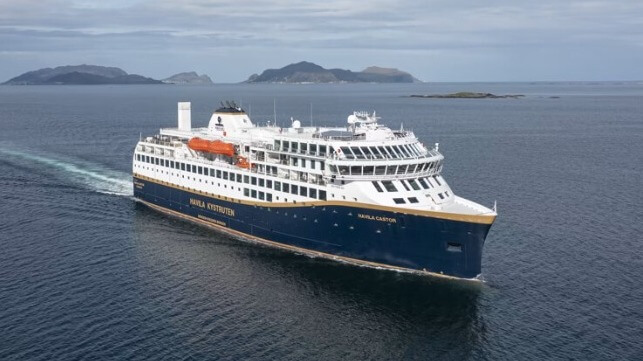Design Approval for Hydrogen Fuel Cell System for Cruise Ships

The cruise industry is at the forefront seeking to deploy new technologies for its future energy systems. In the latest development, DNV reports it has awarded the Norwegian technology provider HAV Group preliminary approval for a hydrogen-based energy system. The preliminary approval means that HAV Group can enter the final design stage and is one step closer to commercializing its hydrogen system.
“Getting a hydrogen energy system off the ground is a complex and very challenging undertaking, and we are very proud to have come this far,” said Gunnar Larsen, CEO of HAV Group. “Getting to this stage has been the result of four years of cooperation with our internal and external partners in the FreeCo2ast project and excellent support from experts at DNV.”
DNV worked with the technology companies for the development of a system that uses liquefied hydrogen storage and fuel cells. It was created as part of the FreeCO2ast project, which is currently developing a high-capacity hydrogen energy system that can be retrofitted onboard two coastal cruise vessels owned by the Norwegian operator Havila Kystruten.
Havila is one of the pioneers seeking to lead the deployment of new energy technologies. The company is currently building four coastal cruise ships for operation along the Norwegian coastal route from Bergen to the Arctic Circle. The first two vessels, Havila Capella and Havila Castor, have been delivered and became the first coastal cruise ships powered by liquified natural gas and batteries. The line promotes the battery pack as the largest in the world with a capacity of 6.1 megawatt hours (MWh), meaning it can operate for up to four hours solely on its batteries. On June 2, Havila Castor plans to become the first ever cruise ship to sail into Geirangerfjord purely on battery power. It is four years ahead of the Norwegian government’s commitment to limit entry into the world heritage site to zero-emission vessels.
Havila is one of several cruise lines reported to be working on hydrogen fuel cell technologies. Viking Cruises has been speaking of hydrogen power for several years and recently MSC’s new brand Explora was reported planning a hydrogen fuel cell powered cruise ship. Larger ships, including those at Royal Caribbean Group and MSC, are also exploring fuel cell technologies.

that matters most
Get the latest maritime news delivered to your inbox daily.
According to DNV, green hydrogen could play an important role in the decarbonization of shipping, both in terms of its potential as an enabler for synthetic fuels, as well as its direct use as ship fuel. However, hydrogen’s unique properties make it a complex fuel to work with, and the lack of prescriptive regulations means that companies wishing to launch hydrogen systems need to follow the IMO guidelines on alternative design. As with all emerging fuels, the maintenance of high safety levels when using hydrogen is paramount.
“The alternative design approval process is used for novel ship designs that cannot be approved with the current prescriptive regulations and the final approval is granted by the Flag State,” explained Ivar Håberg, Director of Approval, Ship Classification, DNV Maritime. “Our assessments have shown that HAV’s preliminary design complied with the goal and functional requirements in the IGF Code (IMO International Code of Safety for Ships using Gases or other Low-flashpoint Fuels). This means that HAV Group has successfully demonstrated that its concept fulfills the initial criteria for safe and reliable operations with hydrogen as ship fuel.”
